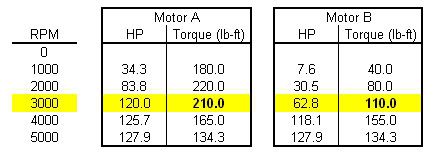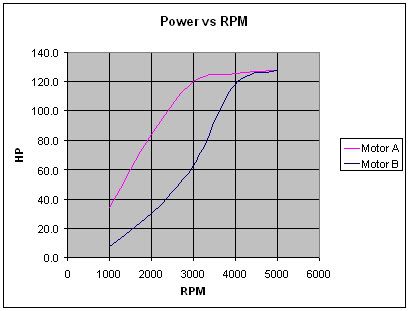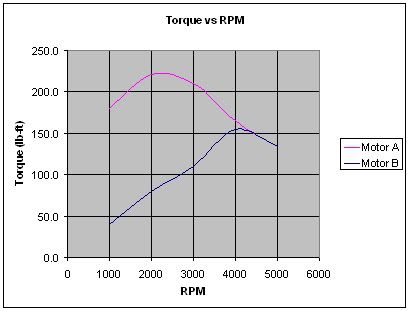Re: Inboard vs outboard performance
Outboards make the same power for less weight.
With the right prop they will have better performance.
If, IF, all else is equal, then I
totally agree. Buuuuuuttttttt . . . the problem is that all else is not possibly equal. Again, weight balance, center of gravity, trim leverage (distance and angle from hull), yes, even torque curve differences (although I
totally agree with 45's attempt at explaining this) will change performance attributes.
So I am not mucking up this torque curve discussion as it is a pet peeve of mine to get this right . . . let's take an example comparing two OBs so that we don't have the variables inserted by the I/O vs. OB discussion. If we have the same horsepower at the propshaft, say 227.9 bhp at 5000 RPM. Same weight, same gear ratio, same props, all same/same, heck same boat as we can easily swap OBs . . . with the one exception being that OB "A" has 100 lb/ft. more torque at 3000 RPM than OB "B"". And this torque benefit is not only at a single point i.e. there is a curve that shows this peak at 3000, but it is a nice smooth curve up to the exact same torque at 5000 RPM (has to be the same torque if they both make that 227.9 bhp at the same RPM). Then OB "A" will have better hole shot.
Soooooo if you are deciding between two OBs for a marginally powered and heavy boat, or you are concerned about deep water slalom skier starts, then OB "A" would be the better choice. If you are a leisurely fishing guy, or you have a reasonably light and free type hull and you just go out with the wife for picnics and sightseeing trips, and acceleration does not matter to you much, then you will not care (or use) that extra 100 lb/ft. Top speed of both examples will be exactly the same. If you disagree, please reread as both examples are EXACTLY the same except one as higher peak torque.
Again, ALL else must be equal, even the size of your butt

If you want to discuss the possibility that the OB "A" with the extra 100 lb/ft design
might exhibit better fuel efficiency at cruise then that is another discussion. It is not guaranteed, it is not automatic, but it
might be true. Can't say without my theoretical example's data laid out for us to examine . . .























